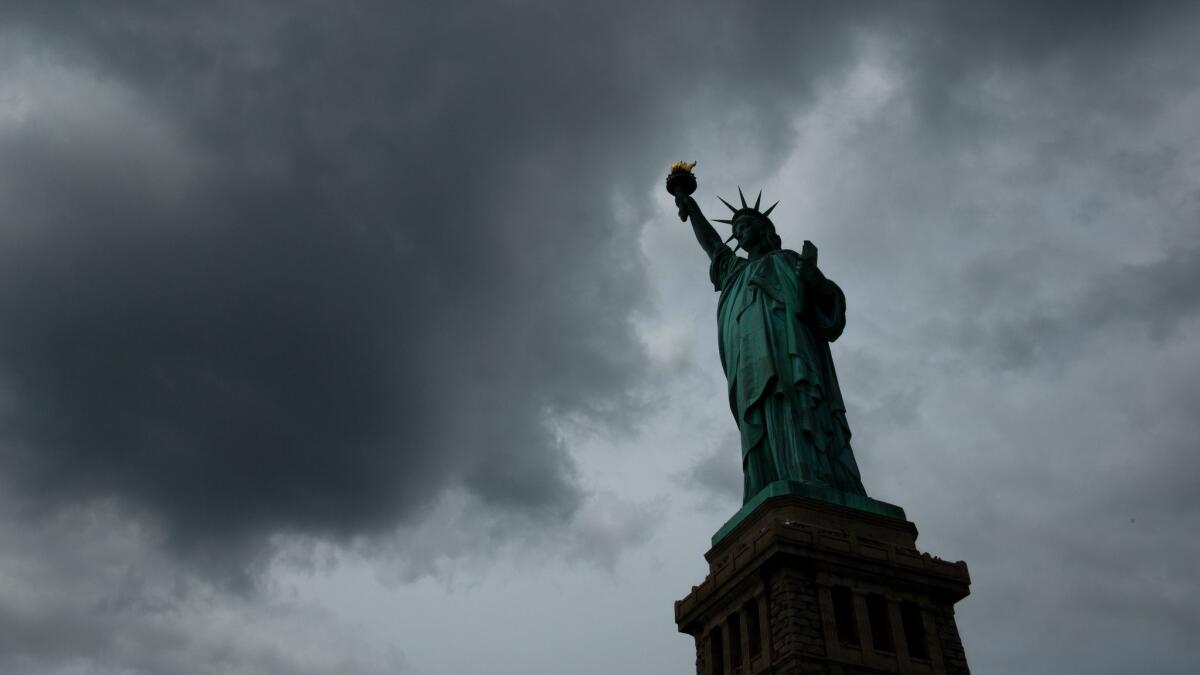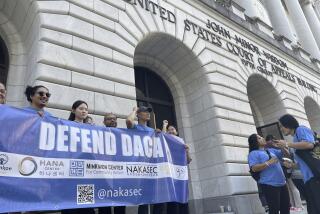Opinion: Court decisions are falling Trump’s way on a bad immigration policy

- Share via
Two down, one to go.
Federal judges in three separate circuits issued injunctions — two nationwide, one limited to the 9th Circuit — against President Trump’s pending “public charge” rule, which would make immigrants ineligible for green cards if they sign up for certain public benefits.
On Monday, the 4th Circuit Court of Appeals in Richmond, Va., joined fellow jurists in the San Francisco-based 9th Circuit Court of Appeals in lifting injunctions after the federal government persuaded them that it likely had the legal authority to adopt the new restrictions.
That leaves the 2nd Circuit Court of Appeals, which is mulling an appeal of a nationwide injunction issued in October by a district court in New York City, as the last barrier.
The lower court decisions hinged on complaints by immigrant advocates and several state attorneys general (including California) that the government violated the federal Administrative Procedure Act by adopting an “arbitrary and capricious” policy that exceeded its authority under immigration law. But two appellate courts now say the government likely had the authority to do what it did.
Even if that is true, that doesn’t make the new rule good policy. Much like the government’s effort to require potential immigrants to prove they could cover anticipated healthcare costs (that also has been held up in the courts), the public charge rule is clearly aimed at reducing the number of poor people admitted to the country and increasing the ranks of the wealthy.
You know, fewer people from those infamous “shithole countries” in Africa, South American and the Caribbean, and more from wealthier nations in Europe, such as Trump expressed favorite, Norway (good luck with that, as my colleague Paul Thornton once pointed out).
In typical fashion, the White House used the Monday decision as a point of attack.
“The 4th Circuit’s lifting of the lawless nationwide injunction imposed against the administration’s public charge immigration regulation is a major step forward for the rule of law,” the White House said. “It is our hope that the 2nd Circuit will, like the 9th and 4th Circuits have already done, lift the meritless nationwide injunction a New York district court has imposed against the rule so that it can be enforced, consistent with the plain letter of the law, for the benefit of all citizens and lawful residents of this country.”
But the “public charge” rule is not a benefit to all. It makes life tougher for people who have already immigrated and who are hoping to be joined by their families — allowed under decades of U.S. policy — and it counters our national economic interest.
As The Times editorial board wrote in September when the proposed rule surfaced:
“The government estimates that the new regulations would negatively affect 382,000 people, but advocates say that is likely an undercount. And the rules would keep people from coming to the country who economists say are vital for the nation’s future economic growth. President Trump’s xenophobic view of the world stands in sharp contradiction not only to American values, but to the nation’s history. We are a country of immigrants or descendants of immigrants, and as a maturing society we will rely more and more on immigration for economic growth. Research shows that even those who start out in low-wage jobs, and thus are likely to get some financial help from the government, often, over time, learn or improve skills that move them into higher income brackets and help the overall economy.”
So in the administration’s efforts to reduce immigration of all stripes, it continues to push policies that appease Trump’s narrowing base while working against our collective national interest.
More to Read
A cure for the common opinion
Get thought-provoking perspectives with our weekly newsletter.
You may occasionally receive promotional content from the Los Angeles Times.











